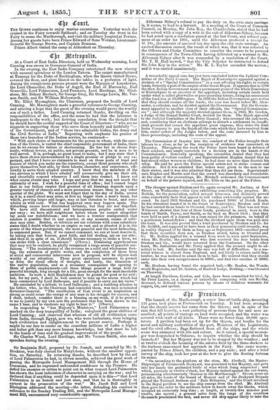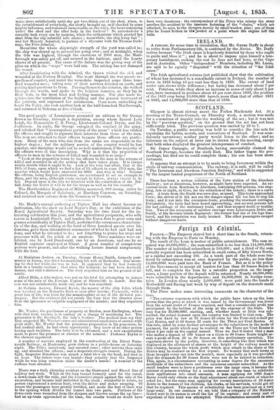Vratuurto.
The launch of the Marlborough, a screw line-of-battle ship, mounting 131 guns, took place at Portsmouth on Tuesday. It had been arranged that she should receive her name from the Queen ; and in spite of the rain that fell heavily, a vast gathering of persons from far and near as- sembled; all points of vantage on land were occupied, and the water was covered with craft of all kinds. There were no fewer than 60,000 spec- tators. A pavilion had been set up for the Queen, and booths for the naval and military authorities of the port, Members of the Legislature, and the civil officers; flags fluttered from all the ships, and the whole scene was animated with life and colour. As it rained, a special messen- ger was despatched to Osborne, to inquire whether the ship should be launched ? But her Majesty was not to be stopped by the weather ; and at twelve o'clock the booming of the salutes fired by the three-deckers in the harbour announced her approach in the Fairy. She came accom- panied by Prince Albert, the children, and a gay suite ; and after a brief survey of the ship, took her post at the bow to give the floating fortress its name.
"On ascending to the platform at the stem, Mr. Abethell, the Master- Shipwright of Portsmouth Dockyard, was presented to her Majesty, and gave into her hands the garlanded bottle of wine which hung suspended ; and wrhoincohl,n!)criencisesillynuait twelve o'clock, lismertoMtljeestiardlittreoduarststhhoeu tscuat-rw a teoriz Pall sides, tbge bands of the simultaneously Success
of Honour and of the Dockyard Brigade played the National Anthem and 'Rule Britannia,' and the Court returned to the Royal pavilion to see the ship emerge from the shed. Mr. Abethell then gave the order to the artificers below to knock away the blocks, which occupied an ominously long time ; at length, at twenty-five minutes put twelve she moved ; a general salvo from the lungs of the countless thousands proclaimed the fact, and never did ship appear likely to take the water more satisfactorily until she got two-thirds out of the shed, when, to the astonishment of everybody, she slowly brought up, as if checked by some mighty influence, and remained immoveable on the ways, the bows remaining under the shed and the after body. in the harbour ! So unlooked-for a casualty took every one by surprise, while the enthusiasm which greeted her start from the slip subsided into silence ; meanwhile, the ship hung fast " ; and her Majesty departed, to partake of a dejeuner with Sir Thomas Coch- rane, the Port-Admiral. Meantime the whole shipwright strength of the yard was called in; the ship was shored up to prevent her going over ; and at midnight, when the tide was highest, through the exertions of 2000 men, the Marl- borough was safely got off and secured in the harbour, amid the hearty cheers of all present. The cause of the failure was the giving way of the piles on which the "ways" were laid out. The mishap has not damaged the vessel.
After breakfasting with the Admiral, the Queen visited the si,k and wounded at the Portsea Hospital. She went through the wet parade re- gardless of comfort, and under the verandahs inspected some three hun- dred wounded men ; taking note of their services detailed on cards, and putting kind questions to them. Passing thence to the interior, she walked through the wards, and spoke to the helpless inmates, as they lay in their beds, in the most kind and feeling manner. She also made in- quiries into the ventilation of the building and the general treatment of the patients, and expressed her satisfaction. Once more embarking on board the Fairy, she took another look at the half-launched Marlborough, and returned to Osborne at five o'clock.
The good people of Leamington presented an address to Sir George Brown on Saturday, through a deputation, among whom figured Lord Leigh, the Honourable C. B. Percy, Lieutenant-Colonel Tryon, and Dr. Jeafferson. In reply, Sir George eulogized the conduct of the army, and rebuked that "unscrupulous portion of the press" which has vilified the officers and sought to separate their interests from those of the men. The men are attached to their officers because those officers are gentle- men. Many of the men who rise from the ranks are respectable in the highest degree ; but the military service of the country would be less popular, and discipline would not be so well maintained, it the majority of the officers were of this description. Why is it that the proportion of officers to men in the returns of killed and wounded is so large ? "Look at the proportion borne by the officers to the men in the returns of killed and wounded in all the actions that have taken place. It is always nearly double what it ought to be. Look at the very last affair, that of the 18th of June, upon which we find a list of 93 officers to some 1308 men, the number which would have answered for 3000. And why is this ? Because the officers, being English gentlemen, are accustomed to set an example to them, and the men, although ready enough to follow, always expect to be led. Depend upon it the less we interfere with the constitution of the Bri- tish Army the better it will be for the troops as well as for the country."
The Hertfordshire Regiment of Militia mustered, 600 strong, under its Colonel, the Marquis of Salisbury, at Ilartham Common, on Saturday, and received new colours from the Countess of Verulam.
Mr. Mechis annual gathering at Tiptrce Hall has almost become an institution, like the show on Lord Mayor's Day, or the exhibition of the Royal Agricultural Society. Saturday was the time fixed for the in- teresting celebration this year, and the agricultural peripatetic, who sells razors in Leadenhall Street, and teaches the Essex flats to grow corn and grasses scientifically at Tiptree Hall, performed the ceremonies characteris- tic of the day, and walking at the head of three hundred guests over his domains, gave them intermittent summaries of what he had and had not done, and what he intended to do ; not forgetting to praise his crops and recesses with all the relish of an amateur. Three machines were ex- lited, one by Lord Dundonald, one by an American, and one by an English engineer employed at Ghent. A great number of conspicuous persons were present, and after the walking lecture feasted sumptuously with the host.
At Maidstone Assizes, on Tuesday, George Henry Smith, formerly post- master at Jersey, was tried for murdering his wife at Rochester. One morn- ing he shot her while she was in bed. It appeared that he had formerly been in a lunatic asylum ; that since the homicide he had been decidedly insane, and still remained so. The Jury acquitted him on the ground of in- sanity.
Alfred Hills, a tide-waiter, was put on his trial for attempting to induce some of the men of the Foreign Legion at Shornclifle to desert. But the case was not satisfactorily made out, and he was acquitted.
At Bodmin Assizes, Edward Rawle, the master of the ship John, which was wrecked on the Manacles Rock so soon after leaving Plymouth, with a great loss of life, was tried for the manslaughter of one of the ill-fated pas- sengers. But the evidence did not satisfy the Jury that the disaster arose from the ignorance or culpable negligence of the master; and they acquitted
Mr. Wooler, the gentleman of property at Burdon, near Darlington, whose wife died from arsenic, is in custody on a charge of murdering her. The prosecutor is Mr. Brecknell, the lady's brother. The medical men say that they suspected Mr. Wooler—some one administered small doses of arsenic with great skill ; Mr. Wooler had the poisonous preparation in his possession, he had medical skill, he had every opportunity ; they knew of no other person having such facilities. The body is to be exhumed, and a new examination made to prove the presence or absence of the mineral : Professor Taylor is the chemist appointed.
A number of navvies employed in the construction of the Direct Ports- mouth Railway, at Haslemere' grew riotous in a public-house on Saturday night. The Felice interfered, and arrested some ; other navvies then came up, and attacked the officers; and a desperate struggle ensued. During the fight, Inspector Donaldson was struck a fatal blow on the head, and died in an hour. The rioters were very brutal—they actually beat the Inspector while he was lying senseless under the doctor's hands ! A number of the ruffians were arrested.
There PM a truly alarming accident on the Gravesend and Strood line of railway last week. While in the long tunnel formerly used for the canal, a down-train left the rails, and the locomotive struck against the side of the excavation, and became half imbedded in the chalk : wonderful to relate, no person experienced a serious hurt, even the driver and stoker escaping. Of course the passengers were greatly terrified, and made the best of their way to the opening which divides the tunnel into two parts. Portions of the down-rails were wrenched from the sleepers and thrown across the up-line- bed an up-train approached at the time, the results would no doubt have
been very disastrous : the correspondent of the Times who relates the story ascribes the accident to the insecure fastening of the "chairs," which are attached, he Rays, bathe sleepers merely by small wooden pins; one of these pins he found broken in the :socket at a point where the engine left the rail&



























 Previous page
Previous page